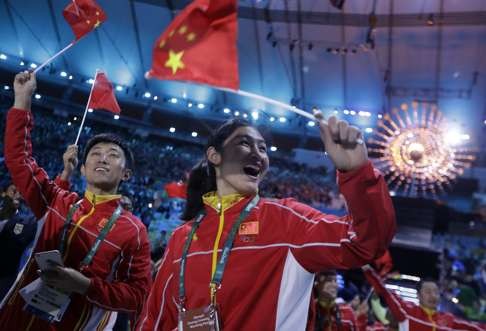
Eight years on from Beijing 2008, an Olympic summer of love has turned sour in Hong Kong
Gary Cheung says given the growing ranks of Hong Kong youth disillusioned with China, banning independence talk in schools can only fan the antipathy
The year 2008 should be remembered as a watershed in the relationship between Hong Kong and the mainland.
In May of that year, thousands of residents poured onto the streets in Hong Kong to cheer the Beijing Olympic torch rally. A month later, 51.9 per cent of Hong Kong people identified themselves as Chinese, according to the University of Hong Kong’s public opinion programme, the highest percentage recorded since the survey started in 1997. That year, many Hongkongers took pride in China winning 51 gold medals at the Games, surpassing America’s 36. In the summer of 2008, mainland officials were right in saying that the majority of Hong Kong people were patriotic.
Hongkongers’ post-1997 identity crisis at the heart of youthful mistrust of government
But things quickly went downhill. In 2009, the writer and activist Liu Xiaobo ( 劉曉波 ) was convicted and jailed for subversion after he co-authored Charter 08, a manifesto calling for democracy. The treatment of Liu, who was awarded the Nobel Peace Prize the following year for his two decades of non-violent struggle for civil rights on the mainland, sparked an outcry from some Hong Kong people.
The subsequent jailing of activist Zhao Lianhai, who sought redress for the 300,000 victims of tainted milk powder produced by Chinese dairy companies, as well as the mysterious death of Hunan (湖南) pro-democracy activist Li Wangyang, reinforced negative perceptions of mainland authorities.
In more recent years, the influx of mainland travellers to Hong Kong also stirred local anxiety about competition in nearly everything, from seats on MTR trains to property, further fuelling antagonism.
In 2012, the pushback against the introduction of a national education curriculum reflected a deep-seated distrust of Beijing. Its officials’ heavy-handed approach in handling Hong Kong’s electoral reform further alienated the city’s younger generations, many of whom now want nothing to do with the mainland. Unsurprisingly, the proportion of Hong Kong people identifying themselves as Chinese had dropped to 30.7 per cent by June this year.

Hong Kong student’s transformation: from support for Chinese athletes in 2008 to independence backer in 2016
During the 1984 Olympics in Los Angeles, Chinese gymnast Li Ning ( 李寧 ) became a household name in Hong Kong after winning three gold medals. Four years later, in Seoul, Hongkongers lamented the blunders made by an off-form “Prince of Gymnastics”, who failed to win a single medal.
But gone are the days when Hongkongers cared much about the performance of any Chinese athlete. During the Rio Games, which ended on Sunday, Hongkongers were mostly indifferent towards the Chinese team. At times, social media was even flooded with mean-spirited comments after some of China’s top hopes failed to clinch gold.

Government should not pass the buck on independence talk
Back in 2008, it would have been inconceivable that, in eight years’ time, calls would ring out for Hong Kong independence. Some of the secondary school students who now head localist groups were once proud supporters of the Chinese team at the Beijing Olympics. Shouldn’t we find out why these disillusioned and probably naive youngsters have turned their backs on China?
Splitting from China would only lead Hong Kong to a dead end, but the best way to curb independence talk in schools is to allow discussion of the topic under teachers’ guidance. Students should be reminded of the infeasibility, costs and consequences of Hong Kong breaking away from China.
Any attempt to ban or limit talk of Hong Kong independence in schools would only cause our questioning students to head off campus for information – to people with political motives, or the free-for-all internet.
Gary Cheung is the Post’s political editor

